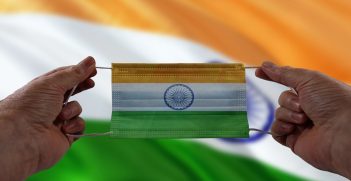What do the Indian General Elections Tell us about Kashmir’s Future?

India has been grappling with several contradictions under Prime Minister Narendra Modi’s BJP rule since 2014, often characterised by cultural prioritisation over secular liberalism, rising nationalism, and Hindu-first ideologies. Despite these challenges and decreased political inclusivity, Modi has retained significant popularity and power.
India’s General Elections were recently held over seven phases between 19 April and 1 June 2024. Prime Minister Narendra Modi’s BJP did not win by a landslide like they did in 2019, but they will serve a third term as the ruling party of India. With accusations of spreading disinformation, crackdowns on civil liberties, and other human rights abuses, is it any wonder voters favoured the opposition? In the contested Muslim-majority region of Kashmir, however, the BJP were nowhere to be seen and did not field any candidates, making the results even more complicated. Perhaps this is because they already dominate Jammu (the other half of the union territory) or because they maintain federal rule over Kashmir and do not need the seats. Nonetheless, Kashmir recorded the highest voter turnout in the past 35 years.
A Pandora’s Box
The Indian political system is a parliamentary system, and Modi’s BJP have been in control since 2014. It would be fair to say that India is a country of contradictions. It is the largest democracy in the world, yet the previous two BJP terms have been characterised by anti-minority violence, prevalent human rights abuses, draconian laws, and a rise in anti-Islamism in recent years. So why has Modi retained his power?
Modi and the BJP have been extremely popular over the past decade, with his vision of an India that “prioritizes culture and religion over notions of secularism and liberalism.” Modi is a right-wing populist leader with a huge celebrity-like platform that he uses to his advantage. India, for Modi, has always been a Hindu-first nation and with a population that is 80 percent Hindu, a point to be particularly admired and accepted.
One of the main priorities in the recent election strategy was the diffusion of Hindu nationalist ideology. This time, without the National Democratic Alliance (NDA), the BJP would have failed to secure a majority on its own. The 2024 results are not what Modi would have hoped for and the rise of the Indian National Developmental Inclusive (INDIA) opposition coalition has significantly challenged the BJP and their Hindutva ideology. This might seem like a silver lining for Muslims in India, but parties belonging to the INDIA alliance fielded fewer Muslim candidates this time than they did in 2019 at a time when Muslim representation in parliament was already at its lowest since independence in 1947. Non-BJP parties fielded 115 Muslim candidates in 2019, but the newly formed INDIA alliance fielded only 78 Muslims this year. Aside from the complexity of coalition politics, a lot can be said on what this might mean for the Muslim-majority region of Kashmir.
What About Kashmir?
What is Kashmir’s role in the latest election results? In 2019, Article 370, which granted special status to Kashmir and allowed the region to have its own flag and constitution, was revoked, and Kashmir became two union territories and was integrated as a part of India. Some argue this brought to an end years of insurgency and violence. Others say this completely disempowered Kashmiris and further reduced their autonomy and self-determination. As India’s only Muslim-majority region and population, Kashmiris have suffered as a consequence of rising anti-Islamism during Modi’s first two terms, being treated as second-class citizens, having policies that encourage demographic shifts forced upon them, and other draconian laws that negatively impact their everyday lives, such as the Citizenship Amendment Act, Armed Forces Special Powers Act, and Public Safety Act, to name a few.
Despite the above, since the revocation in 2019, Modi has followed the first narrative, namely, that normalcy has returned to Kashmir. To re-affirm his position, Modi visited Kashmir twice this year. The first, in March 2024 and again in June. Even more ironic are the large billboard signs welcoming Modi to Kashmir while, in the background, Indian security forces patrol most street corners in Srinagar, intensifying an already highly securitised situation. His first visit was in the run up to the elections where he promised that there would be a regional assembly election in Kashmir. The second visit, after winning his third term, Modi returned to Kashmir to celebrate a victory for democracy, praising Kashmiris, saying, “you have kept the flag of democracy aloft, and I have come to thank you.” But Modi did not field any candidates in the Kashmir Valley, so it is unclear why he is thanking Kashmiris. There were five seats up for grabs in the union territories. The BJP did win two seats in J&K, but they were the districts of Jammu and Udhampur. Independent candidate Abdul Rashid won the 3rd seat of Baramulla from his prison cell. The JKNC (Jammu and Kashmir National Conference) won the other two seats in Srinagar and Anantnag-Rajouri.
It could be argued that political participation is not the response most would expect from Kashmiris, instead associating them with separatist militant organisations or assuming that they would react violently towards the elections. It also shows the shift in political consciousness within Kashmir and the ability for Kashmiris to implement change through the democratic process of voting. It may also be that Modi’s visit to Kashmir and his positive attitude towards increased political participation suggests that his heavy-handed approach is softening. Ruling by fear no longer works, and it seems that Modi has realised the strategic importance of Kashmir/Kashmiris more than ever. Maintaining control through increased securitisation might not be an option anymore, focusing rather on encouraging political participation.
What’s Next?
If the regional assembly elections go ahead as planned next month, political agency in Kashmir might go a long way to settling some of the grievances towards the central government. This is a shift recognised in my own analysis since April to a slightly more positive outlook on Kashmir’s future. There is also hope that, with a regional assembly election that, gone are the days of the 1980s where corruption was rampant, and instead this might encourage and promote stability and enhance trust in the political system. There is hope that Kashmir can now enter a new phase; electing its own government and ridding itself of being trapped under Central rule. It is also an achievement for some members of the wider Indian Muslim population who believe a setback for Modi is a win for the minority communities. Either way, it seems Kashmiris have no choice to participate if they wish to enact meaningful change in the Valley.
Dr Leoni Connah is currently a Lecturer in International Relations at Flinders University. Her PhD and ongoing research explores human rights abuses in Kashmir and the changing nature of the conflict in recent years.
This article is published under a Creative Commons License and may be republished with attribution.





